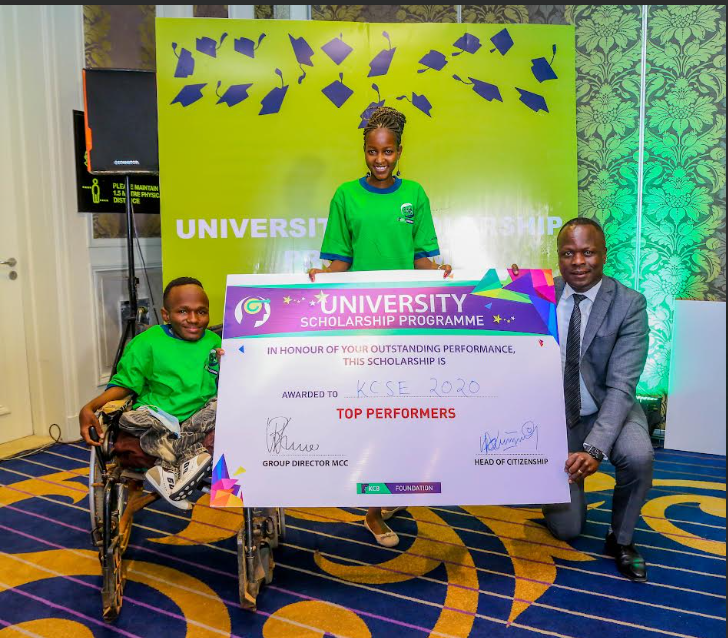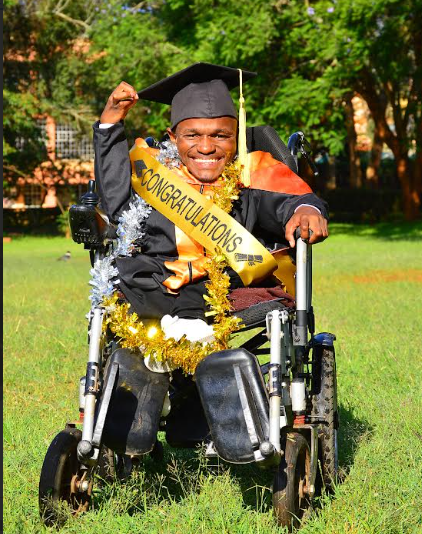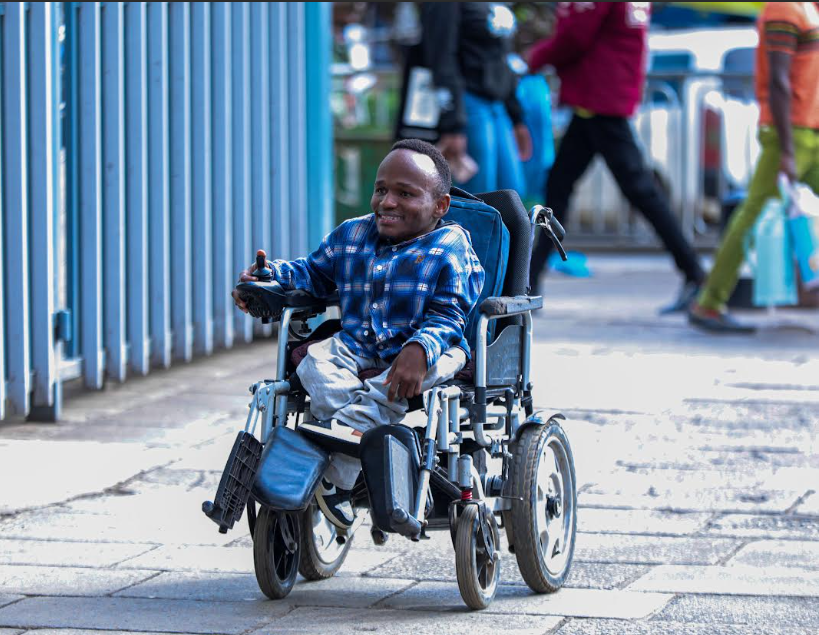

More than half of those who are differently abled are women, and more PWDs live in rural areas than urban areas.
Lack of access to special facilities and support that this group needs further compounds their unique problems, even for those who live in urban areas where these facilities are supposedly more available.
It is even harder for those residing in informal settlements. The situation is precarious for this demographic.
We meet up with Michael Kimeu to learn how he navigates life as a person living with disability in Nairobi. Our meeting point is at the iconic Kencom bus stage in the CBD.
Kencom stage is known for its bustling activity, with buses jostling for the limited parking space as touts battle to woo the multitude of passengers waiting to transit to their various destinations.
On an ordinary day, the bus stage is a challenge to navigate, even for able-bodied people. But for some, like Mike, as he prefers to be called, the challenge of navigating the Kencom area is many times more complex due to his state.
Every morning, Michael navigates his way to the CBD and into Kencom House, which lends its name to the bus stage.
Watching him navigate his electronic wheelchair through the chaos of the Kencom bus stage area and eventually into the calmness of ‘Wing A of Kencom House’, where he works at KCB Bank as an intern, one is awed by the ease of his movement and the confidence he enthuses.
“Hii nimezoea (I am used to this),” he says in his typical soft and ever-smiling demeanour, referring to his ability to deftly navigate through the hubbub of the Nairobi CBD with ease.
Born with disability, Mike sat his Kenya Certificate of Primary Education in 2016 at the Masaku School for the Physically Challenged, where he undertook his primary education.
“My primary education was relatively smooth. The school I was in is purely designed to accommodate students with physical limitations. I enjoyed it,” he says.
But as fate would have it, after KCPE, his family ran into financial headwinds and was unable to raise funds for him to proceed with his secondary school education.
“Unfortunately, my father got involved in a road accident while I was sitting my KCPE exams,” Mike recounts.
“His medical bills made it hard for my family to send me to school. There weren’t many resources available, most of it went into treating him.”
Fortunately, his former principal came to his rescue and advised his parents to seek help from KCB Foundation, who were recruiting students for their scholarships programme.
He promptly applied and was successful, joining Kathonzweni Boys’ High School in 2017. The scholarship from KCBF covered school fees and upkeep, including mentorship and psychosocial support.
However, Kathonzweni Boys’ High School was not designed to accommodate students with physical limitations.
“It was my desire to join a school for able-bodied students so I could interact with normally abled students and explore the diversity of interacting with them in a normal school setting,” he says.
To accommodate Mike and make his learning experience less challenging, the then principal redesigned the facilities to fit his needs. This had a profound effect on his schooling and contributed to his exceptional results after sitting his KCSE exam.

UNIVERSITY AND BEYOND
In 2021, KCB Foundation launched its university scholarship and apprenticeship programme, whose main objective is to psycho-socially empower students already participating in its scholarship programme and had excelled in their KCSE exams.
This initiative was set up to help exceptional students transition to institutions of higher learning and continue with their studies by paying their university fee and supplying them with a laptop.
Mike was again selected to participate in the programme as a top performer in KCSE. He joined Dedan Kimathi University of Technology to pursue a bachelor’s degree in information technology, which he successfully completed and recently graduated in on December 6.
Mike’s experiences with the KCB Foundation Scholarship project are a microcosm of the impact the Foundation’s scholarship programme has had on thousands of needy students since its inception.
The KCB scholars’ programme was established in 2007 to primarily help bright and needy students access quality education, and most importantly, to ensure progression from one level to another, and the impact is significant. Up to Sh2 billion has been paid out as school fess for more than 5,750 students across 537 secondary schools in the country.
In 2022, the education programme was evaluated and improved to accommodate more participants. Initially, only 240 students would receive scholarships each year, and 40 slots were reserved for students with special needs. But after the evaluation, the number was boosted to 1,000 students, with 100 slots reserved for students with special needs.
To further impact the lives of PWDs, KCBF has partnered with other stakeholders, such as the National Council for Persons with Disability.
The NCPWD helps in mapping out disabled students who could potentially participate in the scholarship programme and provide linkages to vendors who supply specialised assistive devices for PWDs.
Other partners include the Kenya Institute of Special Education and the Elimisha Watoto Foundation.
After successfully completing their tertiary education, KCBF offers students apprenticeship opportunities at their local KCB bank branch across the country or at the head office, where they shadow bank professionals and pick up vital work experience.

BANKING APPRENTICE
Mike is one such beneficiary, where he is building his capacity in IT.
“I have always had a passion FOR technology and dreamt of being in IT,” he says in a soft voice as he punches away at his laptop keyboard on the 7th floor of Kencom House, which hosts the bank’s technology department.
“It has not been easy to get to this point as a PWD, but KCB Foundation has held my hand all through,” he says, adding that his role involves assisting the bank with its networking issues.
A recent report released by the Kenya Bankers Association found that, of all the employees in half of the banks in Kenya, only 1 per cent are PWDs. The report further indicates that only 0.5 per cent of PWDs in Kenya are financially included.
KCB Bank is taking deliberate action to include more PWDs in its programmes, including drafting into its human resource policy a clause to reserve slots in its vacancies to be filled only by PWDs going into 2025 and beyond. The bank also reserves slots for PWD suppliers in its sourcing policy, with up to 10 per cent of its suppliers being PWDs.

These actions complement KCB Group’s efforts in aligning its operations with the Sustainable Development Goals number 1, 8 and 10. These aim to tackle issues of poverty, considering that PWDs rely heavily on others for their sustenance, access to decent work and economic growth.
These initiatives have earned the bank accolades. At the inaugural Banking Industry Sustainable Finance Summit and Catalyst Awards held recently, KCB Bank emerged best in the ‘Best bank case study PWD accessibility’ category, an achievement that demonstrates the bank’s commitment to ensuring inclusion for PWDs.
Looking ahead, Mike is excited about his future. Having recently graduated from university, he hopes to further his education and inspire other young PWDs to venture into the IT space.
He envisions a world where both able-bodied people and PWDs are given equal opportunities in life.
“It’s all possible. It’s not about what you can’t do, but about what you can achieve,” he says as he recaps the challenges he has faced in life. “If I can get to this point, so can many others,” he adds, proving that limitations do not affect one’s potential.














